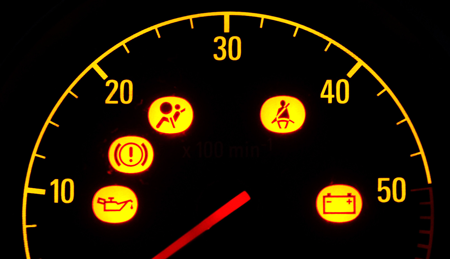Most anyone who has driven a car knows that when the “idiot lights” on your dashboard light up, it is never a good thing. Although the “idiot lights” are designed to inform the driver that there is a problem with the car’s mechanical or electrical systems, when one or more such warning lamps actually do light up, the lamps do not give any data on exactly what the problem is. The “idiot light” that is probably the most familiar to most divers is the dreaded “check engine” light, and anyone who has experienced that particular warning knows that the lamp does not give the driver any specific information on what system might be faulty. The “check engine” light tells you that there is a problem somewhere, but it doesn’t tell you anything more than that, and by the time the light comes on there is a good chance that some damage to the vehicle has already occurred.
The warning lights do not give the driver any specific details on which specific components have failed and how extensive or expensive the repairs will be. That might be the reason people call them “idiot lights.” Or they could have earned the nickname by the fact that “one would have to be an idiot” not to know that there already was a problem with your car by the way it performed (or failed to perform). However, they could just as easily be called “dumb lights” as it is a fact that the current “idiot lights” on your dashboard are definitely not very intelligent or informative.
The engineers at Chevrolet would like to change that situation by changing your “idiot lights to “smart lights” with new technology that would actively monitor a vehicle’s systems and component health and inform drivers about which specific parts might require immediate attention. Chevrolet also wants to make the lights smart enough that most of the warning notifications would be made before a vehicle is actually damaged by the fault. Chevrolet’s new “smart” technology will monitor a car’s various mechanical systems by way of electronic sensors that will send real-time data to General Motors’ OnStar communication system. The OnStar servers will then utilize proprietary algorithms to make calculations to determine if a vehicle’s components are all operating properly. Once a problem is detected, OnStar will send the driver an alert notification through a text message or an email, as well as by way of a flashing “smart light” on the dashboard.
This would not be the first use of Chevrolet’s technology combining cloud-based computing functions into vehicle systems powered by OnStar, as users of OnStar can now already use the service to monitor their vehicles’ oil levels and tire pressure through email updates. However, the next level of new technology will allow drivers to monitors their cars continuously in real time without the need to wait for emailed updates to be sent to them. So far, General Motors is limiting the new generation of “smart lights” to its Chevrolet brand only, but applications for Buick, Cadillac, and GMC can’t be too far behind if the system works as intended. Present plans call for the new technology to debut with the 2016 models of the Corvette, Equinox, Silverado, Silverado HD, Suburban and Tahoe. Future plans include expanding the “smart” technology to more vehicles as well as the ability to monitor more individual car components and systems.

